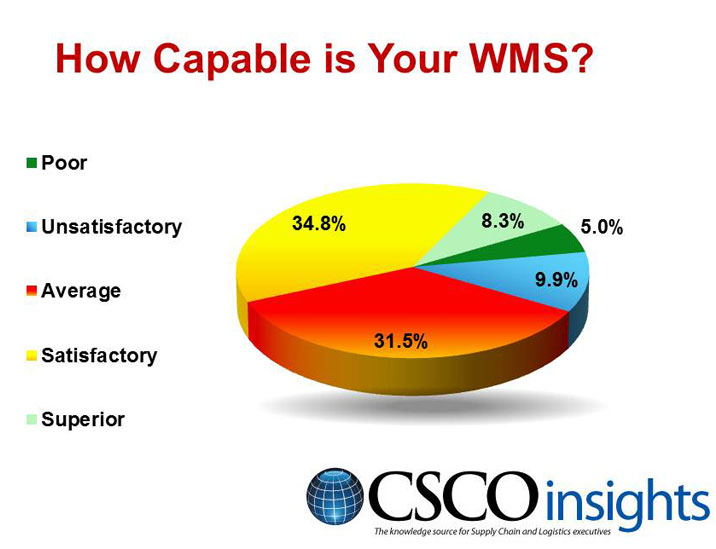From SCDigest's On-Target E-Magazine
- Oct. 23, 2012 -
Supply Chain News: Research Says Better Performing Distribution and Transportation Organizations have Better Software
Chief Supply Chain Officer Insights Finds Companies Saying they are Functionally Effective are Much More Likely to Rate Their Software Capabilities as High
SCDigest Editorial Staff
It is a little bit of a "chicken and egg" question for sure, but recent research from Chief Supply Chain Officer Insights find a strong evidence that companies that rate themselves as high performers in the functional areas of transportation and distribution also say they have much better Transportation Management and Warehouse Management software than do companies that say they are less effective in functional performance.
SCDigest Says: |
 |
| That obviously begs the question: can a company be excellent in given logistics functional area today without high end software to support it? |
|
What Do You Say?
|
|
|
|
That observation comes from the recent Supply Chain Execution Technology 2012 Benchmark report from CSCO Insights, the research arm of Supply Chain Digest, which covered a lot of ground relative to WMS, TMS, Labor Management Systems (LMS), supply chain visibility and other aspects of supply chain execution.
The headline news from the study is that there is a big trend towards companies adopting integrated supply chain execution or logistic "platforms" that connect a wide variety of different applications under a common technology framework that allows more sophisticated workflows across the suite of solutions. This can improve process efficiency and allow more rapid response to changing logistics needs and opportunities.
Currently, just 13% of respondents say that they are running on this type of integrated platform. But a full 39.9% of respondents say they have plans to move to such a unified platform over the next several years.
While we will always have "point" applications to meet emerging or special needs, the trend towards these platform strategies seems finally to be coming together, after years of predictions that this is how the logistics software market would evolve.
This survey data from the report is supported by comments from leading SCE technology vendors selling and implementing more complete solutions, undergirded by a unified technology platform to make it all work together.
But in addition to those results relative to SCE platforms, the report contains a wealth of other information and insight, such as that relative to performance and technology noted at the start of this article.
As shown in the graphic below, when respondents were asked, for example, how capable they viewed their current WMS solution, just 8% said they were "superior," and another 34.8% answering "satisfactory."

However, earlier in the survey CSCO Insights asked companies how they rated their current distribution performance.
(Distribution/Materials Handling Story Continues Below
)
|